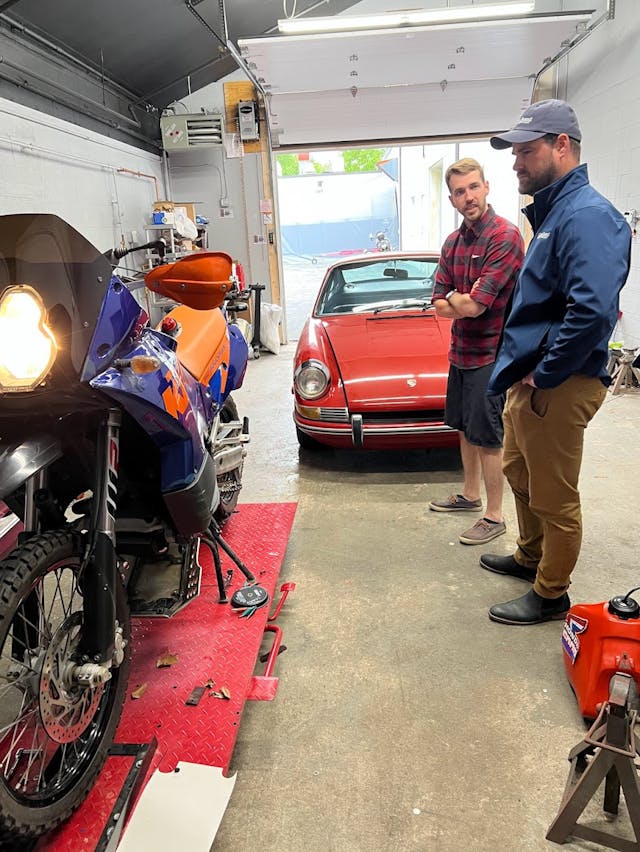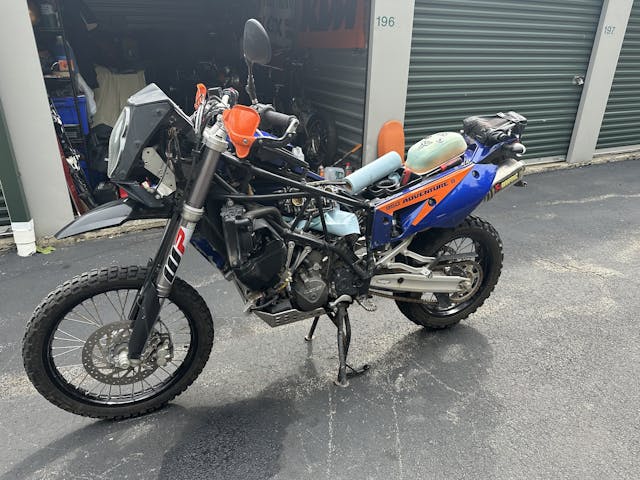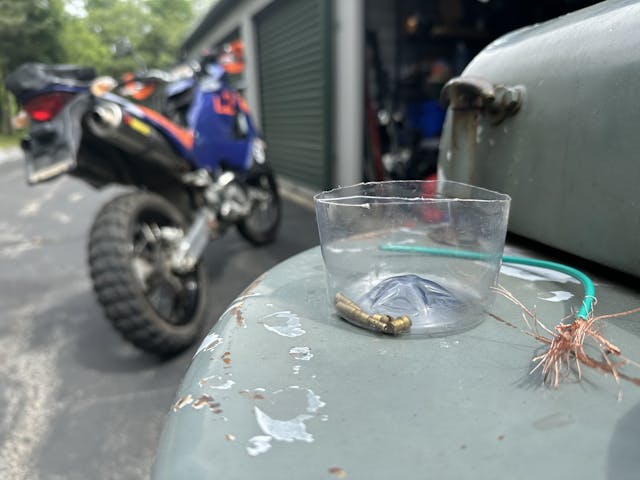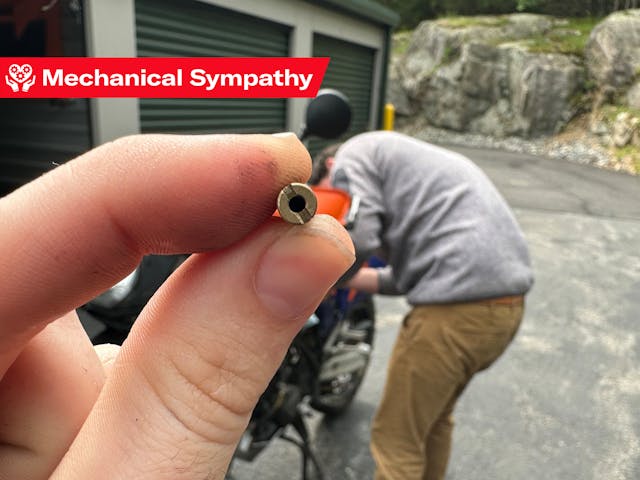Got voices in your head? You are okay, I promise
After much consideration, I have to admit that there are voices in my head. You probably have them, too. Not the voice that tells you to buy another rusting shell of a car, despite the threats from your significant other, but the voice talks you through how a mechanical system works and helps you diagnose its problems.
I would be more concerned if you didn’t hear a voice like this.
An internal monologue is critical for those who spend hours in the garage. The latest example in my life happened when I was standing in the driveway of a friend next to a 2005 KTM 950 Adventure S, which I had recently purchased from him. The motorcycle popped and snorted, its engine barely running and only with the choke fully engaged. I thumbed the kill switch, and before the engine was quiet again, my brain had debated through and settled on problem and solution.

My friend agreed with my diagnosis. I could tell by his sigh: Like me, he had accepted that the junk lodged in the jets of the KTM’s two carburetors was not going to loosen up and disappear on its own. Each of us had stories of putting fresh gas in a motorcycle’s tank and riding the bike carefully until the solvent nature of gasoline worked with the vacuum of the engine to “self clean” the metered orifices of the carburetors. This would not be one of those times.
I could tell by the tools he grabbed that we had just walked the same mental path: Remove the left gas tank, lift off the air filter plate, flip the carb rack but leave it assembled so you don’t have to re-sync the cables and butterflies. Each of us knew that the float bowls on those big Keihin carbs were held on with four screws, and that everything was sealed with O-rings rather than with gaskets; the job would require only a little delicacy.
We tore into the bike.

Experience allows this sort of unspoken analysis. The more ways you have seen mechanical problems solved, the more creative your brain will become. If you have done a water pump on a small-block Chevy from the 1960s, you likely have at least a little confidence that you could tackle the job on a small-block Ford of the same era. Only the foolish mistake this combination of experience and confidence for recklessness or insanity; Understand the basic principles of a system, and suddenly the actual task is not so bad.
Think of someone who can look at an object, whatever it is, and understand how it works. You know this person. If you are like me, you are probably annoyed by them, because it feels as if their brain works so much faster than yours. I remember watching as Hagerty’s own engine expert, Davin Reckow, tore down the flat-four VW engine for a Redline Rebuild video a few years ago. Holding greasy parts in both hands, he looked down into the depths of the engine and cocked his head: “Huh, I’m surprised they did it that way.”
Did what how? He had never seen inside an engine like that one.
Before Davin ever picked up a tool, the voice in his head had run down what he expected to see and how the components would work. Sure, sometimes he is leveraging the fact he has done the same job hundreds of times. But in the case of the VW, he relied on his extensive understanding of how an engine is designed to work, and why certain parts in it look and function the way they do.

The voices inside of our heads actually make us sane. They allow us to process, unpack, and sometimes overcome the hurdles and challenges of decades-old technology. Your internal monologue is partly a scanning of your mental filing cabinets and partly an examination of prior experience: Both sources of information will inform the course you chart. Once you recognize it as a the tool it can be, and learn to trust it, this voice will become incredibly powerful.
Or maybe it is a sign that, like me, you really are crazy.
***
Check out the Hagerty Media homepage so you don’t miss a single story, or better yet, bookmark it. To get our best stories delivered right to your inbox, subscribe to our newsletters.



Yes
Great story Kyle, and spot on. People look at me funny when I’m working on somethgin and I say to myself: “hey, one at a time”. Sometimes the people in my head tend to talk over one another. 🙂
Many years ago I worked with and for a racer/fabricator who had – and still has – an infallible grasp of mechanical operation and physics. Working together, we developed an ability to know the other’s thoughts and next steps, and often handed tools or parts to each other silently and at the right time. It remains my favorite memory of fabbing & restoring old race cars, and we still finish each others’ sentences in conversation.
One of the reasons I still love carburetor’s, logic prevails. Only motorcycle and small engine people understand the propensity of the tiny pilot jet orifices to clog so easily.
Love the stranded copper wire trick to obtain a non damaging probe with a small enough diameter! One of my favorites.
Another cheat if you know the floats aren’t soldered/hollow is “lightly” blow into the fuel inlet with compressed air, often that will work with no disassembly required.
Tiny jets can really be a pain, but it was actually the fact these jets were so large that led us to trying all the shortcuts and tricks before opening them up. It has been a while since I pulled a 178 jet out of a motorcycle carb and it takes a lot to clog one of those. Mainly varnish, not debris, seemed to be what was causing problems. Was actually pretty fun to get into if I’m being honest.
As long the voices in your head don’t say Kill everyone you should be fine.
That’s a fair caveat.
or GET THE BIG HAMMER – THAT’LL GET THE CARB OFF
What if you are surrounded by Ninjas who are intent on snuffing you out and stealing your Honda? Can’t you let those voices tell you to kill them all – ala John Wick?
As vehicles become more and more “computer controlled”, the more the voice in my head just shrugs, says, “WTF?” and suggests I call a repair shop. And if I try to tackle anything remotely considered “electronic”, it just laughs hysterically. At least my voice-in-head knows my limitations! 😋
I’m pretty handy with the electronic stuff, but my neighbor told me the parking brake was stuck in her car and wouldn’t disengage. I said sometimes there’s a little lever under the dash you have to pull, or just push the pedal down a little further. She said there is no pedal, it’s just a button, and the ‘engaged’ light is staying on. I said I’m out… good luck
Funny, there is a mechanical fix for the electronic parking brake. There is a screw in the back of the calipers to disengage them.
“Understand the basic principles of a system, and suddenly the actual task is not so bad.” Amen, Brother! Universally applicable across trades and professions, I’d say.
The one in my head often says “ oh you dumb sh@t, why did you do that?”
😋
You and I both. No one is immune from that voice!
Amen!!!
I have always been amused at the number of people that say, “my mechanic is not familiar ( or can’t) work on anything except X (ford,gm,chrysler, import). If someone has an understanding of internal combustion, oil/coolant/electrical/brakes they should be able to figure out most vehicles.
I often take that to mean their mechanic has figured their shop rate around doing things they know and if a job requires research or other tasks besides tearing straight into it with guaranteed success, they stay away. Have to respect someone who says no to work they don’t want to do, or can’t promise they will do right, even if it is annoying at times.
That was probably true back in the day but these days no one understands the electrical systems in these cars, probably not even the manufacturer who is buying processors from someone else who had someone else program the firmware so on and so forth. The mechanic who knows XLRs for example knows that when the convertible top does this thing, it’s this module under the seat that is probably bad. The mechanical stuff… yeah if you take it apart you can probably figure it out
Having worked as a mechanic for fifty years, both professionally and on my own vehicles, my brain just won’t stop when a problem is particularly challenging. There many mornings when I am lying in bed and just ‘think’.
Very often, the next step in diagnosis suddenly pops into focus. I don’t know why, but that ‘non-productive time’ before getting up for the day, will provide the answer I need. Just letting my mind wander for a while can have fantastic insights.
Likewise, if the ‘answer’ comes to me when I should already be sleeping, I will immediately get up and go to work on it… knowing I wouldn’t be able to sleep anyway, due to the excitement of solving the problem in my head.
Having been a professional motorcycle repair tech for 50 years I find that sometimes I just have to let my hands do the thinking. When my brain can’t remember the tools or techniques required to do the job I just have to start working and let my hands take over.
The term you are describing is “Flow”: Being immersed can be defined as a state of focus in which a person is completely absorbed and engrossed in their work. While in a flow state, people are highly involved and focused on what they are doing.
“The ego falls away. Time flies. Every action, movement, and thought follows inevitably from the previous one, like playing jazz. Your whole being is involved, and you’re using your skills to the utmost,” Your mind is working on a different level almost subconscious intuitive. One thing leads to another as you work. You Just know.
Why are rebuild kits for that SBC water pump not more available?
Or water pump rebuild kits in general, or other parts that could be rebuilt at component level.
When I look into an engine for what is wrong with it,.. say the starter,.. I think of what components are bad
that need to be replaced, not get a new starter, etc., etc….
I guess very few people do that nowadays.
Go to your auto parts or your local hardware store and ask if they have a grinding wheel dresser in stock.
Most all of them will give you a blank stare.
And don’t even think of trying to find a different size brazing nozzle for your cutting rig…special order only.
When I die, the voices of their supposed mechanical heads will be going…what is this or that tool for,etc……
Around 1979 the diaphragm failed in the fuel pump of my Datsun 610 pickup.
I tried to repair/replace the diaphragm without success.
Fords had replaceable diaphragms, but not Datsun. I ended up buying a new fuel pump for around 5 times
the price of a Ford diaphragm.